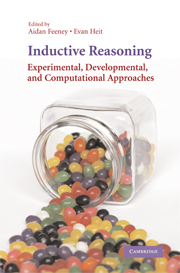Book contents
- Frontmatter
- Contents
- List of Figures
- List of Tables
- List of Contributors
- Preface
- 1 What Is Induction and Why Study It?
- 2 The Development of Inductive Reasoning
- 3 Interpreting Asymmetries of Projection in Children's Inductive Reasoning
- 4 Property Generalization as Causal Reasoning
- 5 Availability in Category-Based Induction
- 6 From Similarity to Chance
- 7 Theory-Based Bayesian Models of Inductive Reasoning
- 8 Use of Single or Multiple Categories in Category-Based Induction
- 9 Abductive Inference: From Philosophical Analysis to Neural Mechanisms
- 10 Mathematical Induction and Induction in Mathematics
- 11 Induction, Deduction, and Argument Strength in Human Reasoning and Argumentation
- 12 Individual Differences, Dual Processes, and Induction
- 13 Taxonomizing Induction
- Index
4 - Property Generalization as Causal Reasoning
Published online by Cambridge University Press: 26 February 2010
- Frontmatter
- Contents
- List of Figures
- List of Tables
- List of Contributors
- Preface
- 1 What Is Induction and Why Study It?
- 2 The Development of Inductive Reasoning
- 3 Interpreting Asymmetries of Projection in Children's Inductive Reasoning
- 4 Property Generalization as Causal Reasoning
- 5 Availability in Category-Based Induction
- 6 From Similarity to Chance
- 7 Theory-Based Bayesian Models of Inductive Reasoning
- 8 Use of Single or Multiple Categories in Category-Based Induction
- 9 Abductive Inference: From Philosophical Analysis to Neural Mechanisms
- 10 Mathematical Induction and Induction in Mathematics
- 11 Induction, Deduction, and Argument Strength in Human Reasoning and Argumentation
- 12 Individual Differences, Dual Processes, and Induction
- 13 Taxonomizing Induction
- Index
Summary
Induction – reasoning to uncertain conclusions – appears in many forms. In some cases one makes an uncertain inference about a specific object or event. Given a particular dog, one asks whether it is safe to pet it; given a particular berry, one asks if it is safe to eat it (e.g., see Chapter 8 by Murphy & Ross, this volume). But in other cases one makes inductive generalizations that are intended to characterize an entire class of situations or objects. On the basis of a finite number of medical cases, one might induce a general causal law, such as that unsafe sex can cause AIDS or that mosquitoes can cause malaria. Or, from a few examples one might make a generalization about a property being displayed by many or most members of a particular category, such as that koalas eat bamboo, Apple laptops have fire-prone batteries, or Madagascar Fire Ants have poisonous venom. This chapter is concerned with category based generalizations such as these in which new properties are projected to an entire class of objects.
Let's consider a couple of examples intended to illustrate two different models of the reasoning processes which are supposed to underlie category-based generalizations. Suppose you are introduced to someone from Uzbekistan, the first person from that country you have ever met. During your otherwise pleasant conversation, you realize that this person has bad breath, and you are led to wonder whether bad breath is common among Uzbekistanis. If you knew nothing about Uzbekistan, you'd probably be unlikely to jump to the conclusion that bad breath was a characteristic national trait.
- Type
- Chapter
- Information
- Inductive ReasoningExperimental, Developmental, and Computational Approaches, pp. 81 - 113Publisher: Cambridge University PressPrint publication year: 2007
- 2
- Cited by



